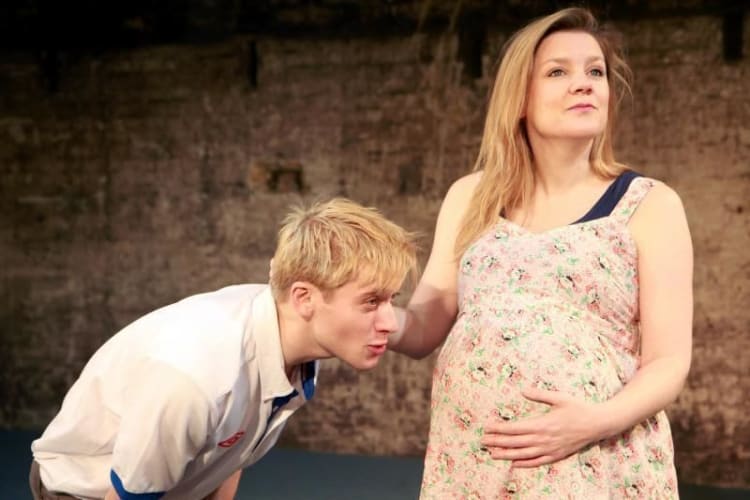Perhaps it's a contemporary concern that was born out of the theatrical landscape of the nineties, propagated by state of the nation plays and recently resurrected by large-scale economic, political and social turbulence, but Shivered's engagement with popular mythologies, with prophecies and dystopias, diffractions from reality and exposure through a confrontational emotional landscape seems to fit almost too succinctly in this landscape.
Ridley's latest play deconstructs the story of two families in the fictional town of Draylingstowe over twelve years, breaking down the chronology of the events in order to isolate scenes with different internal emotional politics. There's talk of monsters and aliens as each protagonist attempts to make tangible the reality of their world, only to get lost in fantasy. There's violent confrontations and profiteering, and the mythologization of a prophet - a twelve year boy crippled by violence with healing power - Jack. There is a construed ambiguity throughout the production that serves well to emphasize different nuances of the narrative, and at its best, Shivered is both sardonic and empathetic, surreal and confrontational.
Shivered is scattered and sharp, underlined by an emphasis on the vulnerability of confronting emotion in strikingly explosive social situations. It's a play that stops short of extremes, uninterested in reality but instead concerned with storytelling as a device; with mythologies that frame our experience, with escapism as a removal from the harshness of reality. In this aspect, Ridley and director Russel Bolam make an excellent team; the agility of the writing and the nuances of the acting raise intriguing and complex questions on the nature of escapism, the lure of storytelling and the easiness with which mythologies are created - with a penchant for their social purpose.
At the same time, Shivered is generic; it's an intense pastiche, but one that doesn't have the consistency and confidence of Ridley's previous work, like Pitchfork Disney or Tender Napalm. The deliberate unevenness of the language - sometimes speaking for the character and at others underlining the subtext of the scene, poetic or vernacular - means there is little specificity to the characters, particularly the protagonists - two young boys - Jack (Josh Williams) and Ryan (Joseph Drake) caught in the problematic social and post-industrial landscape that is Draylingstowe, dominated by a cathartic relationship adults around them have with sex and violence. There's both a subtlety and an exaggeration of these two elements throughout the piece, juggling juxtapositions with disability and race that feel inconclusive in the narrative.
Shivered is grounded in an emotional arc, yet there's also a formal and contextual play with anticipation and a deliberate mention to representations of violence onstage, which Ridley considers to still be a tricky zone for theatre; in a recent interview for Exeunt Magazine, he mentions being influenced by the work of film director David Cronenberg (Eastern Promises, The History of Violence, The Fly) but also writers like Phillip K Dick. The engagement with sci-fi but also the interest in violence as a psychology rather than pathology are intriguing aspects of his work, but underexplored in Shivered.
There's no hint in the production of an intention to shock and judging from Ridley's mixed background - he trained at Central St Martins and works across genres as film-writer, poet and performance artist - there is an interest to explore body horror as translated into social politics onstage. Perhaps this is also what holds the production back, the assumption that violence has a problematic place onstage; Shivered feels much less contemporary that Ridley's previous work, almost caught in a nostalgia for the social concerns of a particular generation. There are moments in the production with characters such as self-professed healer Evie (Amanda Daniels), or mother Lyn (Olivia Poulet), unable to deal with her son Alec's (Robbie Jarvis) death, when we're made to laugh at the characters, not with them; there's a slightly patronising tone towards this set of working class families trapped in a post-industrial depression that doesn't resonate.
In the production, the deliberate minimalism of the staging, the use of light to underline the tone of a scene and the juxtaposition with the language so dominated by atmospheres, textures and colors paints a contrasting and symbolic aesthetic. Violence for Ridley - both in the imagination of his characters and the reality that haunts them - is not representative, but a vehicle. Yet in Shivered, there's a reluctance to subsume the complexity of the play's internal logic, or follow through its disparate threads. In particular, the engagement with the weird and wonderful - in the fraudulent town fair, or the search for alien life - feels trivial, underexplored in a production made to accomodate such an interplay.
Shivered is also packed with flavour; it creates a complex world dominated by extreme emotions and allegorical situations; if it feels out of sync, it's due to its problematic social politics, but there's an openness in the text that makes the piece fluid, a shadow that don't dissipate too soon. The acting is excellent too, with Josh Williams playing a nuanced Jack, Andrew Hawley an intriguing and energetic Gordy and Simon Lenagan as an emotive Mikey.
